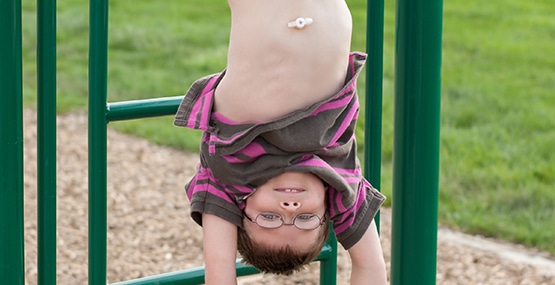
5 Signs Your Child Needs a Feeding Tube
Enteral nutrition is not something to fear. Nor is it forever. In fact, it may be exactly what your kids needs for healthy growth.
-Being told your child needs a feeding tube can feel overwhelming, confusing, and downright scary. But the need for tubes is on the rise: The overall prevalence of home tube-feeding increased from 150,000 patients in 1992 to nearly half a million now, according to the Feeding Tube Awareness Foundation.
And nearly 40 percent of tube feeders are children, according to recent research.
The reasons for needing a feeding tube, also called enteral nutrition, can vary tremendously. Aubrey Phelps, MS, LDN, INFCP, registered pediatric nutritionist at Growing Independent Eaters, says children typically fall into one of two camps.
The first: medical necessity, where the child can't meet their calorie needs due to a medical condition (like, say, a heart defect, neurologic and neuromuscular disorders, or a digestive disorder.)
The second: failure to thrive, often because of food aversions. "These are kids that, for some reason—and there are a variety of reasons—are not eating enough to grow as expected or desired," Phelps says. "The child literally doesn't want to eat or take a bottle."

Because enteral nutrition delivers food directly into the stomach, foods bypass the mouth—and the aversion.
Another example: Premature babies sometimes have trouble learning to suck, swallow, and breathe, Phelps says.
Regardless of cause, malnutrition in children is a serious cause for concern, and something that should be addressed as quickly as possible.
"Nutrition is crucial for normal growth and development, so inadequate calorie intake or poor nutrition can lead to developmental delays and stunted growth," says Melanie Greifer, M.D., pediatric gastroenterologist at Hassenfeld Children's Hospital at NYU Langone.
What's more: Poor nutrition has also been associated with increased infections and poor healing, as well as cognitive delay, Dr. Greifer says.
So as scary as a feeding tube may seem, it may be exactly what your child needs. Here are some of the most common signs your child may benefit from a feeding tube.
Sign #1: Your Physician Brings It Up
If you're wondering whether your child needs a feeding tube, it's likely you're already seeing a doctor regularly to discuss your child's care. Typically, it's that physician who first suggests a feeding tube as a course of treatment.
"Most often, the conversation will be started by the physician who is seeing some of the complications of decreased nutritional intake, or after diagnosing a disorder that may need prolonged nutritional support," Dr. Greifer says.
If your doctor wants to discuss enteral nutrition, it's worth listening. Usually, physicians only suggest it if other treatments haven't worked. Even so, parents often need some time to get used to the idea. But when they finally come around, they generally admit it was the best decision for their child.
If you decide to move forward with a feeding tube, you'll also discuss which is best with your doctor, as Dr. Greifer says the type and placement varies based on the condition being treated.
Sign #2: You've Noticed Development Delays
While your doctor is likely to be the one to first bring up tube feeding, don't let that hold you back if your child's growth and development is causing you concern.
"Parents are their child's most important advocates, and as such, should be aware of cues such as poor weight gain, delays in development, or even frequent hospitalizations for respiratory issues," Dr. Greifer says.
All of these could be indicators that enteral nutrition is worthy of a conversation with your physician. Dr. Greifer notes you'll decide as a team—parent, physician, and pediatric nutritionist—what potential length of time could be needed for the tube, daily care of the tubes and feeding, and whether you'll need additional support or training.
Sign #3: They're Malnourished or Chronically Dehydrated
There are a variety of reasons (some serious, some temporary) behind why your child could be refusing to eat or drink. But if it's gone on long enough that their eating patterns or weight has dramatically changed—potentially even leading to malnutrition or chronic dehydration—that indicates there may be a need for a feeding tube.
"Little ones are not awesome at regulating their body temperature, so when you throw in complications like dehydration, that messes with their heart rate, blood pressure, and temperature regulation," Phelps says. "Their systems aren't prepared to deal with this."
Dehydration may not seem like a huge deal for adults, but think of it this way: Not only do adults have more fat stores than children, Phelps says, but adults aren't trying to grow while maintaining day-to-day functionality. The burden on systems are lower, whereas the needs for children are exponentially higher.
That's why, if you're noticing a consistent refusal to drink (or other signs of chronic dehydration, like dry, flaky skin, frequent headaches, and constant fatigue), you may want to discuss a feeding tube to help fix the problem and avoid long-term health ramifications.
Sign #4: You've Tried Other Options Without Success
Yes, sometimes a feeding tube really is a medical necessity, or the best option for getting your child proper nutrition. It may even be placed as a preventive mechanism to avoid increased trauma later on, Phelps says. But many times physicians don't jump straight to tube feeding, instead opting to try other treatments first.
This is because tube feeding can be invasive. We're all made to orally eat our food, and having to place (and sometimes regularly replace) tubes can be traumatizing for children, so medical teams try to avoid it when possible, Phelps says.
And just like any other treatment plan, there are risk factors involved. "Tube feedings are safe, but can have some risk such as localized skin irritation, infection, tears in the intestine, or even aspiration," Dr. Greifer says. "The tubes can also clog and lead to obstruction, or can dislodge and lead to other complications."
At the end of the day, the least invasive treatments come first. But if your medical team has yet to find long-term success, that may be a sign that enteral nutrition is the next viable solution.
Sign #5: You're Feeling Helpless as the Caregiver
As your child's medical team tries a variety of treatment options, as the caregiver, you're along for the rollercoaster of emotions that come with finding a solution. That can cause a lot of stress and anxiety that shouldn't be overlooked.
"For certain children, tube feeding can be helpful to take some of the pressure off of the caregiver or therapy team, and allow the child to progress at their own pace while still obtaining the needed fuel for growth and development," Dr. Greifer says.
Phelps agrees, recalling the firsthand experience she has with placing her daughter on a feeding tube. "I started crying because it was the first time I was able to hold her while she was eating and she didn't fight me; she wasn't angry," Phelps says. "I knew she was getting what she needed, and there was something magical about that."
Removing that burden gives families room to enjoy their child in a way they may not have been able to yet. "It's a gift to just be able to be their mom or dad for a little while, knowing they're still getting everything they need and that you now have a plan to help make things better," Phelps continues.
Feeding Tubes Aren't Always Forever
If your child does end up needing enteral nutrition, understand that it doesn't always mean it's a forever situation.
"It's hard to say how long a child may need to be maintained with tube feedings … but many children are able to be weaned off and are able to resume oral feedings over time," Dr. Greifer says.
In fact, "our bodies were not made to be on formula for years and years, and we're not made to digest the same thing over and over again," Phelps says, noting there are, of course, always medical cases that are exceptions to the rule.
So just because your child starts a feeding tube doesn't mean they won't eventually be able to come off of it, develop a well-rounded diet, and one day enjoy the experience of eating a solid meal and going out to dinner with the family.
This story has been medically reviewed by Stan Cohen, M.D., a pediatric gastroenterologist at the Children's Center for Digestive Health Care in Atlanta and the director of Nutrtion4Kids Medical Advisory Board.




